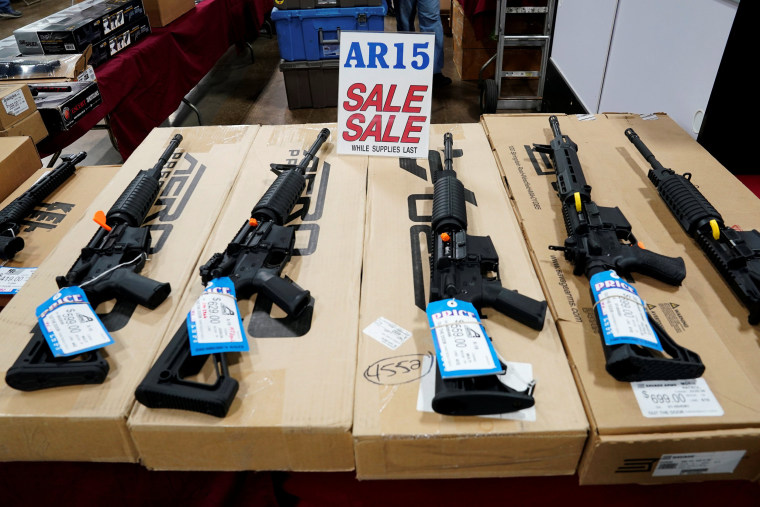First Read is your briefing from Meet the Press and the NBC Political Unit on the day's most important political stories and why they matter
WASHINGTON — Yesterday, a teenager opened fire at Florida high school, killing 17 people — the 18th school shooting of 2018. Last November, a lone gunman killed 26 at a church in Sutherland Springs, Texas. And in October, another gunman killed more than 50 attending an outdoor concert in Las Vegas.
That’s all in the last four months.
And what has Washington done to respond to this mass violence? Absolutely nothing. America’s political system has been incapable of coming up with ANY federal public policy to address mass shootings. In 2013, after the Newtown shooting, the U.S. Senate blocked a measure to require background checks for gun purchases. In 2017, after Las Vegas, Congress talked about banning bump stocks – accessories that makes rifles fire more rapidly – but ultimately did nothing.
Meanwhile, President Trump tweeted his condolences on Wednesday, but said he nothing publicly. “My prayers and condolences to the families of the victims of the terrible Florida shooting. No child, teacher or anyone else should ever feel unsafe in an American school,” he said. But there were no public-policy recommendations on how to make schools safer.
As journalist Ron Fournier observed yesterday, “If we had 18 small plane crashes already this year, Congress would be demanding answers and passing regulations. Thoughts and prayers would be nice, but not enough.”
The only thing less surprising than another episode of mass violence has been Washington’s lack of courage to do, well, anything. And until a politician loses a race because they are considered to be too pro-gun, that won’t change.
There’s a “strong chance” Trump today will address the Florida shooting
A senior administration official tells NBC’s Peter Alexander that there’s a “strong chance” President Trump will publicly address the Florida school shooting today. Per Alexander, this official said some advisers recommended that Trump say something Wednesday, but he opted not to as the tragedy was still developing.
But political journalist Walter Shapiro raises a provocative question: Should Trump address the shooting? Would he make things even worse? “Others may differ on this. But Trump seems so unsuited by temperament to provide comfort after a shooting like this that the best thing is for him not to try,” Shapiro tweeted.
Meanwhile, on Twitter this morning, Trump addressed the alleged shooter. “So many signs that the Florida shooter was mentally disturbed, even expelled from school for bad and erratic behavior. Neighbors and classmates knew he was a big problem. Must always report such instances to authorities, again and again!”
It sure looks like Trump doesn’t want a deal on immigration
Per NBC’s Frank Thorp, a bipartisan group of senators – eight Republicans (Rounds, Collins, Graham, Flake, Gardner, Murkowski, Alexander, Isakson), seven Democrats (Manchin, Kaine, Coons, Heitkamp, Shaheen, Klobuchar, Warner) and one independent (King) – unveiled their immigration deal. The proposal includes $25 billion over 10 years for border security, legal status and a path to citizenship for DACA recipients, and a prohibition of DACA recipients sponsoring their parents for citizenship.
And late last night, the Department of Homeland Security (!!!) released a statement blasting the bipartisan proposal. “SCHUMER-ROUNDS-COLLINS DESTROYS ABILITY OF DHS TO ENFORCE IMMIGRATION LAWS, CREATING A MASS AMNESTY FOR OVER 10 MILLION ILLEGAL ALIENS, INCLUDING CRIMINALS.”
Folks, that’s an administration that doesn’t seem to want a deal. Here’s the legislative reality: To pass Congress, any legislation is going to need 60 Senate votes (and thus many of the people who have sponsored this bipartisan compromise). What’s more, there doesn’t appear to be 218 votes for the GOP Goodlatte proposal in the House. “GOP leaders are far from the 218 votes needed to pass it, according to multiple senior Republican sources familiar with the results of a tentative vote count Wednesday,” Politico writes. “And the speaker has told some members privately that he does not want to put the bill up for a roll call unless it can pass.”
Bottom line: The Trump/GOP-only Goodlatte bill might not be able to pass the House. And the Trump/GOP-only Grassley bill probably can’t get more than 40 votes in the Senate. So you need SOME KIND of bipartisan deal to pass, but the Trump administration is already blasting the bipartisan deal.
And the question is why — do they want immigration and DREAMers to remain political issues in 2018 and 2020?
After a 2016 election fought over the handling of classified information, this is stunning
Ivanka Trump, Jared Kushner and Don McGahn lack permanent security clearances: From NBC’s Carol Lee, Mike Memoli, Kristen Welker and Rich Gardella: “More than 130 political appointees working in the Executive Office of the President did not have permanent security clearances as of November 2017, including the president’s daughter, son-in-law and his top legal counsel, according to internal White House documents obtained by NBC News. Of those appointees working with interim clearances, 47 of them are in positions that report directly to President Donald Trump. About a quarter of all political appointees in the executive office are working with some form of interim security clearance.”
More: “White House officials who are listed as not having permanent security clearances as recently as this past November include Ivanka Trump, the president’s daughter and senior adviser; Jared Kushner, the president’s son-in-law and senior adviser; Dan Scavino, the president’s director of social media; and Christopher Liddell, assistant to the president for strategic initiatives, according to the documents… A total of 34 people who started their government service on Jan. 20, 2017, the first day of the Trump presidency, were still on interim clearances in November. Among them are White House counsel Don McGahn, White House press secretary Sarah Huckabee Sanders and White House deputy press secretary Raj Shah.”
